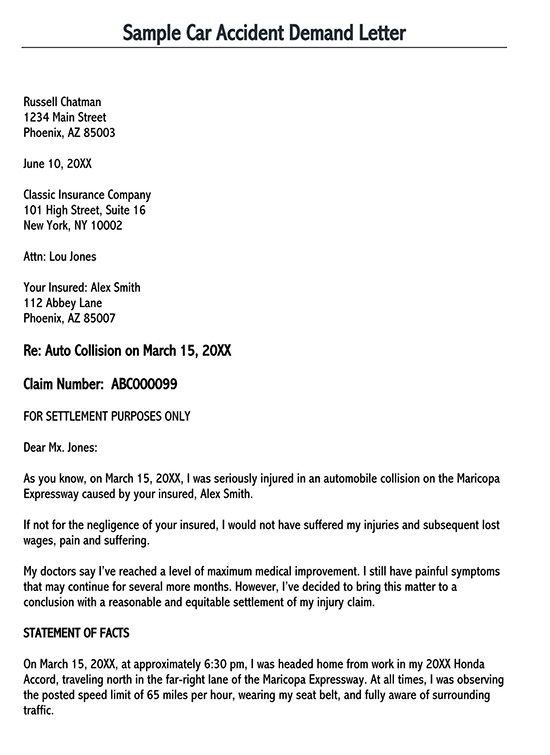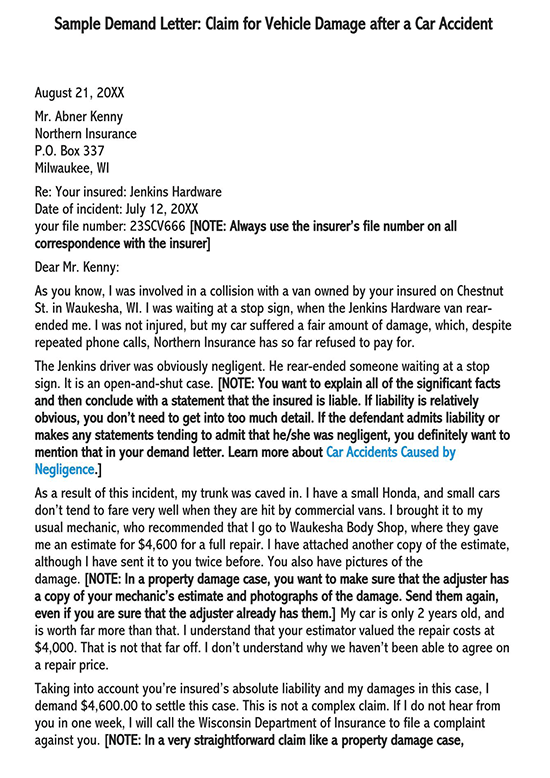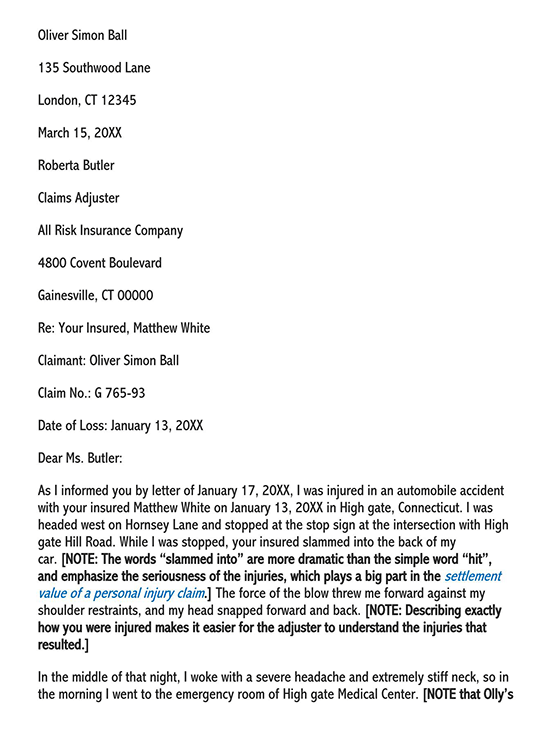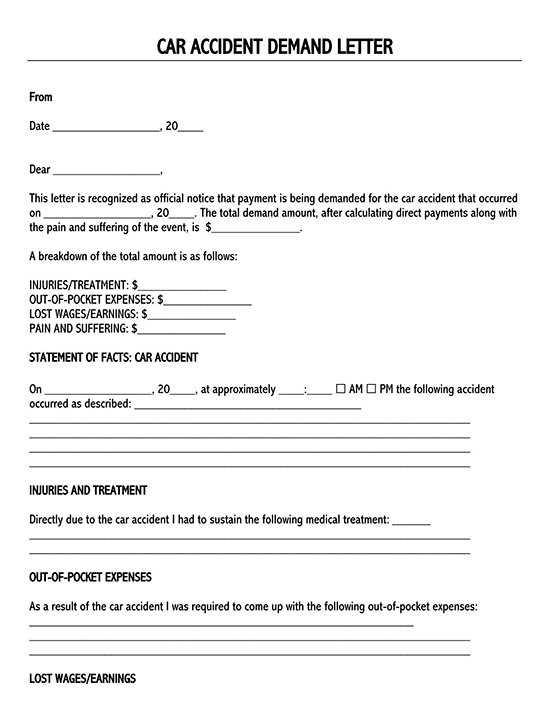A car accident demand letter is used to seek compensation for damages caused by a car accident. In most instances, it involves the driver or passenger, not at fault, who was injured in the accident. The letter serves as a warning to the other party that if they do not compensate you for the damages, you will be taking legal action against them.
Car Accident Demand Letter Templates
What You Must Do After Suffering an Accident
- Request your medical expenses
- Document your injury
- Establish the extent of property damage
- Document your expenses
- Be organized
- Do not overstate and do not be greedy
- Calculate your Pain and Suffering
- Seek professional Legal Advice
Why Should I Send a Demand Letter?
If you suffer damages caused by a car accident and believe that the driver was at fault, then you are entitled to receive compensation from them. One of the most commonly used methods to obtain compensation is to file a claim with the insurance company of the liable person by writing a detailed personal injury demand letter summarizing your complaint as well as the amount of money you are requesting.
Your letter should inform the other party that:
- You believe they were at fault in the accident
- They should pay for the damages they have caused and any other losses incurred about the accident
- The time frame when they are expected to have paid the money and how it should be paid.
EXAMPLE
Bank check or direct deposit to your bank.
- You will take legal action against them should they fail to comply with the demands made.
By simply sending the letter, you may get the other party to pay for the damages, thereby avoiding legal battles, which are usually costly and time-consuming. Make sure to draft your letter well and include the evidence so that if the matter ends up in court, you will have proof showing that you sent the letter.
What to Include in a Car Accident Demand Letter
For your letter to be effective, you should include the following:
Relate the facts
Describe the facts surrounding the accident in detail, including the weather, road directions, the direction you were headed in, and where the at-fault driver was headed. You can also refer to police reports containing citations against the driver, relevant laws such as distracted driving infractions, and other pertinent facts. The account should be composed and not emotional. You should also provide a clear and poised explanation of the physical effects of the accident and provide the insurance company with your version of the events that took place during the accident.
Be polite
Be polite when writing a letter. Do not attack your adversary as much as you may be tempted to do so—be polite but serious at the same time. The more you attack the recipient, the more you push them to respond similarly. When you are calm, you will sound more believable, as this demonstrates that you are confident in your position. This also holds when presenting an argument in court.
Injuries and medical treatments
Give a detailed explanation of the injuries you’ve suffered as a result of the accident. Attach any supporting documents, such as medical reports, bills, or photos showing the damages. It is recommended that you provide all documentation of your claim for medical treatment, including your medical records or correspondence from your doctor describing the diagnosis of your injuries and the treatment you received.
You should describe your injuries in detail, including any long-term disability that resulted from the accident. If you had to undergo surgery, a video of the operation would be great in case the matter escalates and is tabled before a jury.
Medical expenses
Provide all the medical expenses you incur that are reasonably connected to your accident. Add proof to back up the demand in the form of medical reports, hospital bills, and receipts. Do not send the letter to the insurance company until after you’ve completed your treatment.
Damages
Damages can be divided into two categories: economic damages and non-economic damages. Economic damages include medical expenses and lost income as a result of the accident. At the same time, non-economic damages, also referred to as pain and suffering, include any emotional distress resulting from the accident.
EXAMPLE
Depression, anxiety, or post-traumatic disorder (PTSD).
Even though you may not have any documentation to prove that you suffered non-economic damage because it is subjective, you still have to describe how your physical injuries negatively impacted your quality of life.
Your settlement demand amount
After giving a descriptive explanation of the facts and circumstances of the accident, injuries sustained, emotional damages, medical expenses, and lost wages, the last step is now, to sum up, the letter with a specific demand for compensation for all your combined losses. The primary objective of the letter is to reach a reasonable settlement without the need for litigation.
Set a deadline
Include a time frame, usually one or two weeks, for the recipient to respond to the letter. Creating a sense of urgency will push them to respond faster to resolve the matter; otherwise, they will be less motivated to deal with you right away. Conclude by stating that if they fail to respond within the stipulated period, you will take legal action against them.
Supporting documents for your demand should include:
- All the medical expenses, hospital bills, medical records, and any notes from your doctor;
- Police incident report;
- All receipts for out-of-pocket expenses, such as gas used when seeking treatment, and purchase of any pain medications;
- An official letter from your employer concerning your wages and time off work;
- Any photos, videos, or any other material collected from the scene; and,
- Any other relevant paperwork.
Following letter writing
- Make a copy and keep it, as it will come in handy if the matter escalates to the court
- Send the original letter by registered mail, fax, or email or personally hand it to the other party
- Keep a clear record of the date, time, and where you delivered the letter
Template Demand Letter
[Your Full Name]
[Your Address]
[City, State, Zip Code]
[Your Email Address]
[Your Phone Number]
[Date]
[Recipient’s Full Name or Insurance Company’s Name]
[Their Address or Insurance Company’s Address]
[City, State, Zip Code]
Subject: Demand for Payment for Vehicle Damage
Dear [Recipient’s Name or Insurance Adjuster’s Name],
I am writing to formally demand compensation for the damages sustained by my vehicle as a result of the accident on [Date of Accident], involving your insured, [Name of the Person at Fault/Your Policyholder], and myself. The accident occurred at [Location of the Accident], and it was determined by [Police Report/Insurance Investigation/Both] that [Name of the Person at Fault/Your Policyholder] was at fault.
As a direct consequence of the accident, my vehicle has suffered significant damages, necessitating repairs to restore it to its pre-accident condition. Attached to this letter, you will find detailed documentation supporting my claim, which includes:
- The Accident Report: A copy of the police report/accident report that clearly indicates the fault of the accident.
- Photographs of the Damage: Photographic evidence of the damages to my vehicle.
- Repair Estimates: [Number] detailed repair estimates from reputable auto repair shops, indicating the cost of parts and labor required to fix the damages.
- Rental Car Receipts: If applicable, receipts for a rental car used during the period my vehicle was under repair.
- Medical Reports: If applicable, detailed medical reports and bills, if the accident resulted in personal injuries.
Based on the attached documentation, the total amount required to cover the repairs, rental car expenses, and any medical treatments (if applicable) amounts to [Total Amount, e.g., $5,000]. I am demanding full compensation in the amount of [Total Amount] to cover these expenses.
Please be advised that this letter serves as a formal demand for payment to settle my claim without the need for further legal action. I expect a response to this demand letter within [Time Frame, e.g., 30 days] of its receipt, outlining the steps your company will take to compensate for the damages caused by your policyholder.
I trust that we can resolve this matter amicably and promptly. However, should there be an unreasonable delay or denial of my claim, I am prepared to take further legal actions to ensure that I am justly compensated for the losses and damages I have suffered.
Thank you for your attention to this matter. I look forward to your prompt and positive response.
Sincerely,
[Your Signature (if sending by mail)]
[Typed Name]
[Your Contact Information]
Sample Car Accident Demand Letter
Subject: Demand for Payment for Vehicle Damage – Claim #ABC123456
Dear Claims Adjuster,
I am writing to formally demand compensation for the damages sustained by my vehicle as a result of an accident on September 20, 20XX. The accident involved your insured, Mr. David Smith, and occurred at the intersection of Main St. and 2nd Ave. in Riverside, CA. The police report, a copy of which is attached, clearly indicates Mr. Smith’s failure to yield was the cause of the accident, thereby establishing his fault.
The collision caused significant damage to my 2019 Honda Civic, necessitating comprehensive repairs to restore the vehicle to its pre-accident condition. Enclosed with this letter, you will find the following documents supporting my claim:
- The Accident Report: A detailed police report that attributes the cause of the accident to Mr. Smith’s negligence.
- Photographs of the damage: Several photos showing the extensive damage to my vehicle from multiple angles.
- Repair Estimates: Two detailed repair estimates from reputable auto repair shops in Riverside indicate a total repair cost of $3,500. These estimates outline the cost of parts and labor required to address the damages.
- Rental Car Receipts: Receipts totaling $450 for a rental car I used while my vehicle was being repaired, ensuring my transportation needs were met without interruption.
- Medical Reports: Please note that, as this incident did not result in personal injuries, there are no medical reports or bills applicable to this claim.
Given the documentation provided, the total compensation demanded to cover the repair costs and rental expenses is $3,950. I request full reimbursement in the amount of $3,950 to settle my claim against your insured, Mr. Smith.
This letter serves as a formal demand for payment. I expect a response within 30 days of its receipt, detailing how Brightway Insurance Company intends to resolve this matter. I am hopeful for an amicable resolution but am prepared to explore further legal options should there be any delay or denial in fulfilling this demand.
Thank you for your prompt attention to this matter. I look forward to your swift and favorable response.
Sincerely,
[Signature]
Alex Johnson
alex.johnson@email.com
555-456-7890
Key Takeaways
This demand letter for compensation due to vehicle damage is effective and well-structured for several key reasons:
Clear Identification of the Issue: The letter begins by clearly stating the purpose, which is to demand compensation for vehicle damages resulting from an accident. This sets a focused and direct tone for the correspondence.
Presentation of Facts and Evidence: The writer provides a concise account of the accident, including the date, location, and the involved parties, grounding the demand in specific details. The inclusion of a police report as evidence adds significant weight to the claim by establishing fault.
Detailed Documentation: By enclosing comprehensive documentation, including the accident report, photographs of the damage, repair estimates, and rental car receipts, the writer substantiates the claim with concrete evidence. This detailed approach demonstrates the seriousness of the claim and the extent of the damages and financial impact.
Specific Financial Demand: The letter explicitly states the total compensation demanded, summarizing the costs incurred for repairs and rental expenses. This clarity ensures there’s no ambiguity about the compensation being sought, facilitating a straightforward assessment by the insurance company.
Formal Demand and Deadline for Response: The writer formally demands payment and sets a clear deadline for the insurance company’s response, which is within 30 days. This establishes an expectation for timely communication and indicates the writer’s preparedness to take further action if necessary.
Professional Tone: Throughout the letter, the tone remains professional and courteous, despite the writer’s clear intent to pursue compensation. This professional demeanor is more likely to elicit a cooperative response from the insurance company.
Readiness to Escalate: The letter closes by expressing hope for an amicable resolution but also indicates the writer’s readiness to explore legal options if the demand is not met. This balance between seeking a peaceful resolution and being prepared for further action underscores the writer’s determination to secure just compensation.
Contact Information: Providing contact details at the end makes it easy for the insurance company to respond directly to the claimant, facilitating prompt and direct communication.
Overall, the letter’s effectiveness lies in its clear presentation of the facts, comprehensive documentation, specific financial demand, and the professional yet firm tone, all of which work together to make a strong case for compensation.
Benefits of a Car Accident Demand Letter
The court will, in most cases, require you to make a formal demand before filing your lawsuit.
Even though this is not legally necessary, there are two reasons why sending one makes sense:
- Promotes case settlement: In most instances, these letters usually catalyze the settlement—your chances of getting paid increase when you make your case in writing. A concise letter demanding payments helps you avoid the trouble of filing a small claims case. The letter will convince the court of your efforts in trying to resolve the case. It will also inform the other party that they should be prepared to make a settlement, for if you sue, they may end up using a lot of resources to defend the case that they might end up losing.
- Helps you organize your case: With this letter, you will be one step ahead of the defendant, when asked to provide evidence to support your case. The letter will help you think through every aspect of your case, including the facts, law, and evidence you will have to provide to support your case. In short, the letter will make you more prepared to litigate if the need arises.
















